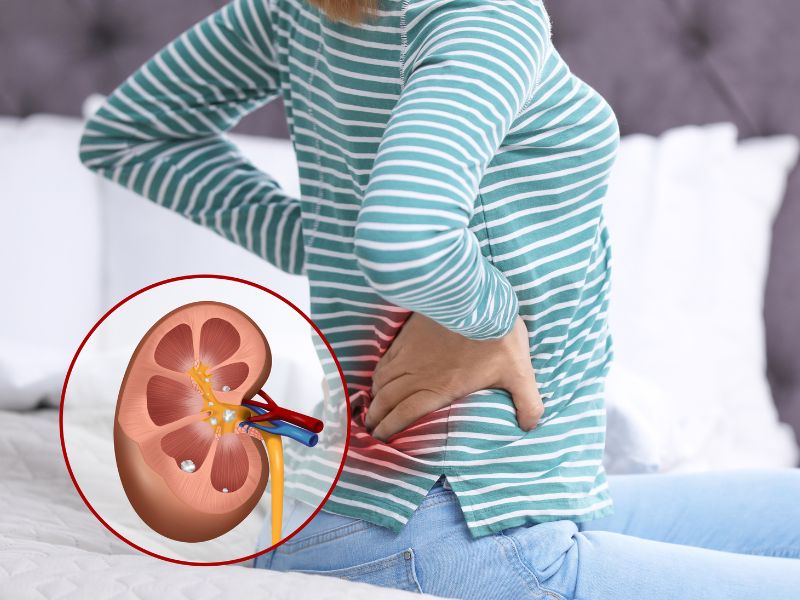Due to increased health awareness, there has been an ongoing concern among people regarding the effects of gluten on the body and how it can affect your overall health. While gluten has been shown to be linked to digestive issues, it is now also being connected to kidney stones. Kidney stones are formed inside the kidney by crystallizing minerals that are hard to filter from the body and, hence, are deposited there, causing pain and discomfort.
This blog explains the connection between gluten intake and kidney stones and how kidney stones can be prevented.
1. Understanding Gluten
What is Gluten?
Gluten is a protein most commonly found in wheat, barley, and rye. It is the protein that gives dough its usual elasticity and helps it maintain its shape. You can find gluten in breads, pasta, cereals, and processed foods. Gluten is often safe for most people, although some might be allergic or sensitive to it. People with celiac disease must avoid gluten to prevent serious health complications.
Gluten sensitivity and celiac disease are medical conditions where the body reacts negatively to gluten present in foods. Gluten sensitivity can cause discomfort in digestion and cause bloating upon consuming gluten, but it is temporary. Celiac disease, however, is an autoimmune disorder in which the immune system attacks the lining of the small intestine each time you consume gluten.
2. Overview of Kidney Stones
What Are Kidney Stones?
Kidney stones are crystallized deposits of minerals and salts that form in the kidneys. They can cause extreme pain in the kidneys and urinary tract. When urine becomes too concentrated, minerals like calcium, oxalate, and uric acid crystallize to form kidney stones. These small crystals bond together to form larger stones over time.
Types of Kidney Stones:
Different types of stones are caused due to different reasons:
- Calcium Oxalate Stones: The most common type of kidney stone, formed when calcium combines with oxalate in the urine.
- Calcium Phosphate Stones: These stones are formed under specific conditions like certain metabolic disorders.
- Uric Acid Stones: Form when urine levels of uric acid increase, usually linked to a diet containing high amounts of animal-based protein.
- Cystine Stones: Rare stones caused by a genetic disorder that increases cystine levels in urine.
3. Does Gluten Intake Affect Kidney Stone Formation?
Presently, there is no scientific evidence that gluten intake increases the risk of kidney stone formation. The major causes of kidney stones are often dehydration, excessive intake of certain minerals, or underlying medical conditions. However, some factors associated with gluten-rich foods can indirectly contribute to stone formation.
Many gluten-containing foods, such as pasta and bread, are heavily processed and may contain a lot of sodium. Kidney stones may occur due to increased calcium excretion from a high-sodium diet. Diets high in refined carbs, which are frequently present in gluten-containing goods, can increase body weight and cause obesity, both of which increase the risk of kidney stones.
4. Celiac Disease and Kidney Stones
Although gluten doesn't seem to cause kidney stones on its own, eating a certain way that involves foods high in gluten may make you more likely to develop stones. A lot of gluten-containing processed foods also have high sodium content, which encourages calcium excretion and may cause calcium oxalate stones.
While oxalates and gluten are unrelated, many people who eat gluten-containing grains may also eat foods high in oxalate, such as chocolate, spinach, and almonds, which can cause stones if ingested in excess.
5. How to Prevent Kidney Stones While Managing Gluten Intake
Kidney stones are more common in people with celiac disease, although gluten is not the source of this increased risk. Rather, the danger arises from the inability to absorb vital nutrients, particularly calcium. Gluten can harm the intestines of people with untreated celiac disease, making it hard for them to absorb fat and calcium. This increases the risk of calcium oxalate stones by causing more calcium to stay in the urine. In celiac disease, fat malabsorption can lead to excessive oxalate absorption and stone production.
If you are looking for a kidney specialist in Indiranagar who can answer all your related questions about kidney stones, schedule an appointment with our expert at Shree Shrinivasa Urocare.

